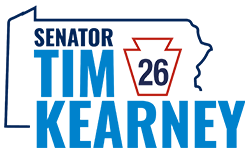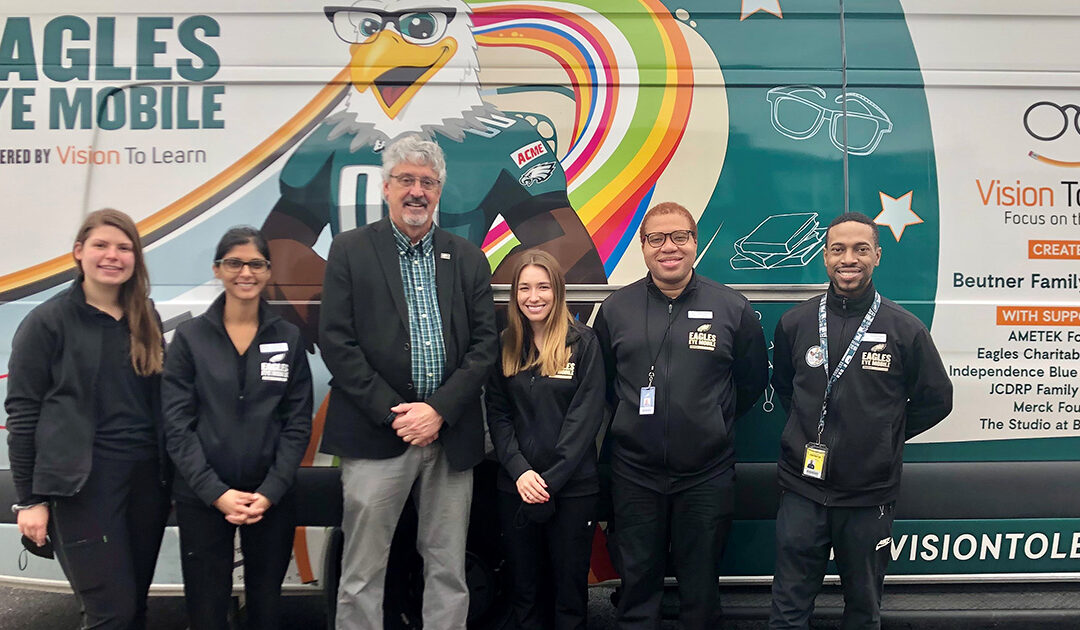Staff from Vision to Learn pose for a quick picture with Senator Kearney in front of the Eagles Eye Mobile vehicle while visiting students at Beverly Hills Middle School in Upper Darby on Thursday.
Vision Health Initiative Provides Free Vision Screenings, Eye Exams, and new, Prescription Glasses to Students in Upper Darby School District
SPRINGFIELD, PA – March 31, 2022 – More than 3,500 of the 12,400 students that make up Upper Darby School District go to school every day without the glasses they need to see the board, read a book, or participate in class. Senator Tim Kearney and the nonprofit Vision To Learn have teamed up to bring vision services directly to students. With $50,000 funding secured with help from Senator Kearney, Vision To Learn has provided 334 students with vision exams, and 267 with pairs of glasses—all free of charge.
For the last 10 years, Vision To Learn has been helping kids in urban and rural communities across the US. Vision To Learn visits schools, where their staff works with classroom educators and school nurses to make sure every child receives a vision screening. For children who do not pass the screening, the Eagles Eye Mobile Powered by Vision To Learn, staffed with trained eye care professionals, visits schools to provide eye exams and glasses — all free of charge to the child and their family.
“As a member of the Education Committee, I’m happy to have been able to secure this funding to meet the needs of the children within the Upper Darby School District,” said Senator Kearney. “I know that equity for students is essential to their success. Sometimes equity means providing students with educational resources like updated textbooks—other times equity means ensuring children have reading glasses to see the words in the textbooks. It’s about creating a level playing field.”
A groundbreaking study recently published in The Journal for the American Medical Association Ophthalmology by researchers from the Center for Research and Reform in Education and the Wilmer Eye Institute at Johns Hopkins University shows the impact of providing glasses to children at schools. The researchers conducted the largest and most rigorous study in the U.S. to measure the impact of providing eyeglasses to students directly in their schools. Thousands of children from more than 100 schools in Baltimore participated in the study. The results were clear. Children who received glasses did better in school and the impact was greater than more costly measures such as lengthening the school day, providing computers, or creating charter schools. The children who showed the biggest gains, the equivalent of an additional four to six months of learning, are those who are often the hardest to help—students in the bottom quarter of their class academically and students with learning differences and disabilities.
The problem is not a new one. About one in four children, whether from a family with means or a family struggling to get by, will naturally need glasses. Children who need glasses and do not have them are more likely to be misdiagnosed with behavioral issues in kindergarten, be considered “slow” learners by 5th grade, and to drop out of high school. Unfortunately, in some urban and rural communities, most children who need glasses do not have them due to financial constraints, language barriers, unresponsive health bureaucracies, or the simple fact there are no eye care professionals in their neighborhood. This program solves the problem by bringing the glasses to the kids where they are almost every day—their local neighborhood school.
COVID-19 has had a disproportionate impact on communities of color and recovery efforts must address the disparities that have been exposed. In most cases, the best place to provide services to families who are struggling to get by is at their local, neighborhood school.
“We know that impaired vision makes learning much more difficult. We also know that many of our students and families in our District struggle to access the eye care they need to be successful in school. It is amazing to partner with Vision to Learn, an organization whose mission is to provide exams and glasses to students in communities like ours,” said Dr. Christopher Pugliese, Director of Pupil Services at the Upper Darby School District. In its continued partnership with Upper Darby School District, to date, Vision To Learn has provided 823 eye exams and 734 glasses to middle school students. The 9th graders at Upper Darby High School are next on the schedule to be screened and examined if needed, with 15 exam days scheduled.
Austin Beutner, Founder and Chairman of Vision To Learn said, “At a time when our country is struggling to figure out what a just and equitable future should look like, this effort provides a good start.” He added, “Our mission is to make sure every child has the glasses they need to succeed in school and in life.”

